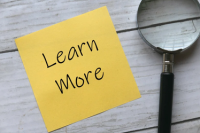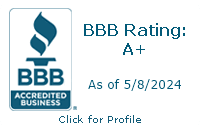Are you having trouble beginning a new project or initiative? Find out why you need to get started now.

I've always liked to learn new things – and that includes learning about the learning process. For many years, my two favorite "go to" methods to explain these concepts have been a quote and a diagram addressing two key questions.
The first question is this – WHAT is learning? A simple question, yet one extremely important to answer because we need a way to know "learning" when we see it. The following quote answers this question:
Learning is a change in behavior. – John Maxwell
The second question is this – HOW do people progress through the learning process? While it is important to define the end result of learning, learning does not happen overnight. We need to know whether, for example, a new employee is making progress, and this diagram illustrating four stages of learning is one way to assess progress.
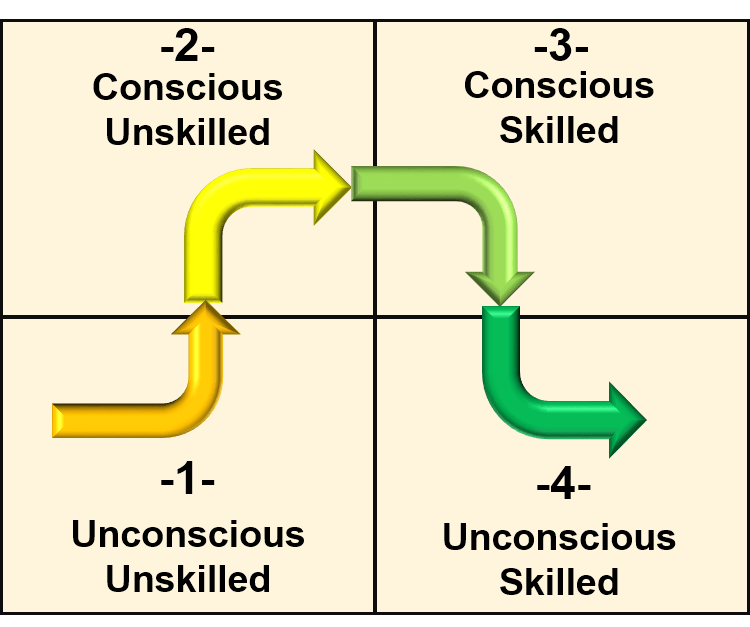
(Source: Based on concepts at www.gordontraining.com)
What Gets "Learning" Started?
A third question about learning recently came to mind – WHAT gets learning started? How does a "change in behavior" begin? What conditions are needed for a person to begin the first stage of learning? I've realized the model needs a Stage 0, a getting started stage:
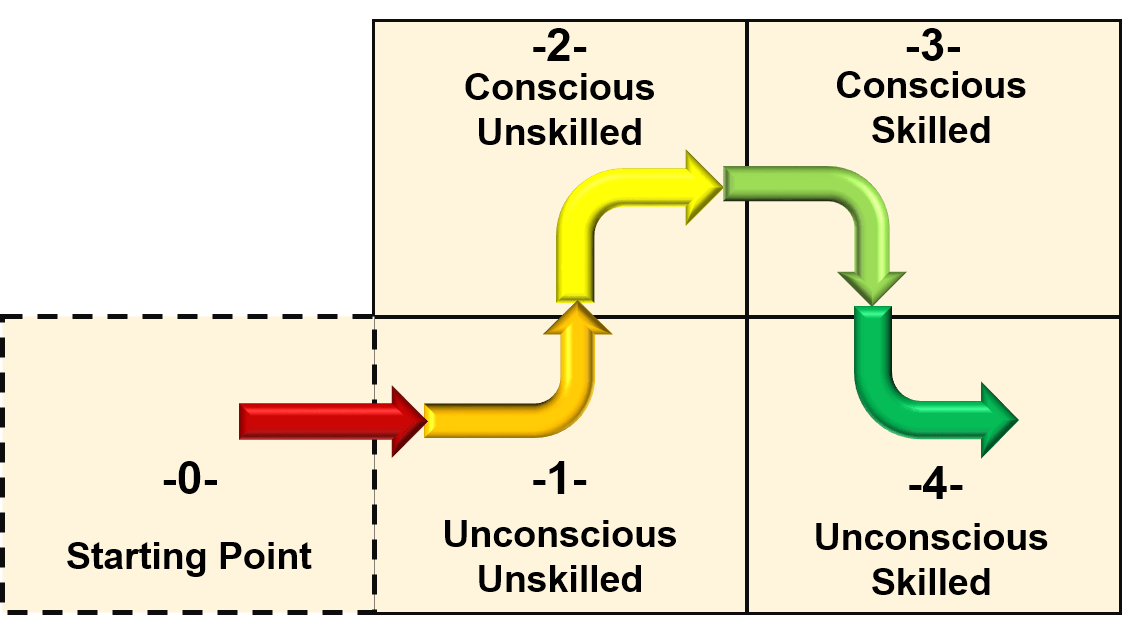
Ideally, people would learn because they want to improve themselves – they see the opportunity learning provides. There is, however, a big difference between the "knowing" aspect of learning and its "doing" aspect.
In the John Maxwell definition, it's not enough for someone to KNOW something different – a person has to DO something differently to satisfy the definition. Get help building new habits with these suggestions.
DO Is Harder Than KNOW
The stages of learning model encapsulates both the KNOW and DO aspects of learning – the former is described by either "unconscious" or "conscious," while the latter underlies both "unskilled" and "skilled." It's one thing to KNOW how to snow ski – it's a completely different thing to be able to DO it, to become skilled enough to get off the bunny slope.
So, the question is – even though we KNOW we should change our actions for the gain potential, might we only DO things differently to avoid or relieve pain? In other words, do we respond to carrots or sticks?
Carrot or Stick?
As much as we might like to think otherwise, I believe the answer is this – most people respond to sticks more quickly than to carrots. A quote by Dr. Henry Cloud reflects this:
"We change our behavior when the pain of staying the same becomes greater than the pain of changing. Consequences give us the pain that motivates us to change."
Think about it – if life is good the way we're currently doing things, what motivation is there to change and learn to do something differently?
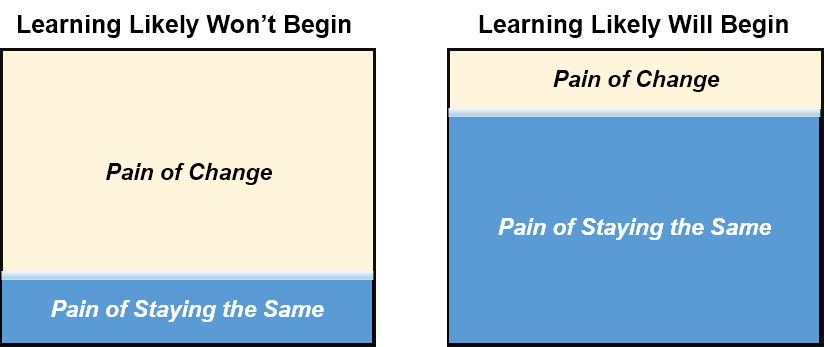
Sometimes, we're in a position to wield a stick and – unpleasant as it is – we genuinely need to send someone a painful message. (I'm assuming the "stick" action is being taken out of sincere concern for the person, with the goal of ultimately being helpful.) Other times, we're on the receiving end. We're all familiar with – either first-hand or through someone else – several "stick" situations:
- Receiving a poor grade.
- Being called out by your spouse for good reason.
- Having to pay a fine.
- Getting a lower-than-desired performance rating.
- Facing an "intervention" by your caring, yet concerned, best friend.
These situations do not actually have to occur to serve as a "stick" – sometimes, the threat of these outcomes is sufficient to cause change.
Yet, here's the thing – a "stick" is an extrinsic motivator, and will only be effective in the short-term. For true long-term change, motivation needs to be intrinsic, based on a person seeing the "carrot" in the situation.
Consider two scenarios in the learning stages model, each where a person got started because of a "stick" and has progressed from Stage 0 to Stage 3:
- Scenerio 1 – The person has aligned KNOW and DO, and stays in the "Conscious Skilled" square indefinitely – motivation became intrinsic and true learning has occurred. For most tasks, achieving the Conscious Skilled level of performance is just fine.
- Scenerio 2 – The person has not aligned KNOW and DO, and slips back to the starting point – the person's motivation fizzled out, and true learning did not occur.
In the second scenario, the "stick" may be applied again to a person who slipped back – and either the person ultimately succeeds, or slides back again. Assuming the cycle of stick-progress-slide occurs several times, the person will become inured to the "stick." What then?
In that case, only the person can learn their own lesson – no one can do it for them. So, the teacher may have to flunk the student, or the manager may have to let the employee go.
These cases also play out in sales situations. If a sales rep calls on a prospect and touts the "gain" of the product or service being sold, yet the prospect feels no "pain," how likely is it the prospect will say "yes"? Not very likely – odds are, a sale will not be made until the prospect experiences "pain," and this may not occur for a long time.
Pain Preference – Self-Discipline, or Regret?
Change will always involve some pain – habits die hard, and we're all more stubborn than we'd like to admit. Of course, failing to change may lead to far worse pain. Here's how John Maxwell frames this choice:
"... [O]ur choices will lead to either the pain of self-discipline or the pain of regret. I'd rather live with the pain of self-discipline and reap the positive rewards than live with the pain of regret, which is something that can create a deep and continual ache within us." -- John Maxwell, The 15 Invaluable Laws of Growth
To me, the pain of self-discipline is really the pain of getting started - making a call I've been avoiding, or taking a first step on a project I want to do yet am overwhelmed by its scope. Once I get moving, things become easier, the call or project goes better than I thought, and any short-term discomfort lessens. Avoid the 'I'll get around to it syndrome' with these tips.
Getting Started – It's Your Choice
Over the next year, you very well may receive – or be threatened with – a low grade, a reprimand, or some other painful consequence. If so, relieve that pain quickly, before it becomes worse – and remember, the hardest step of all is getting started.
Sincerely,

Todd L. Herman


